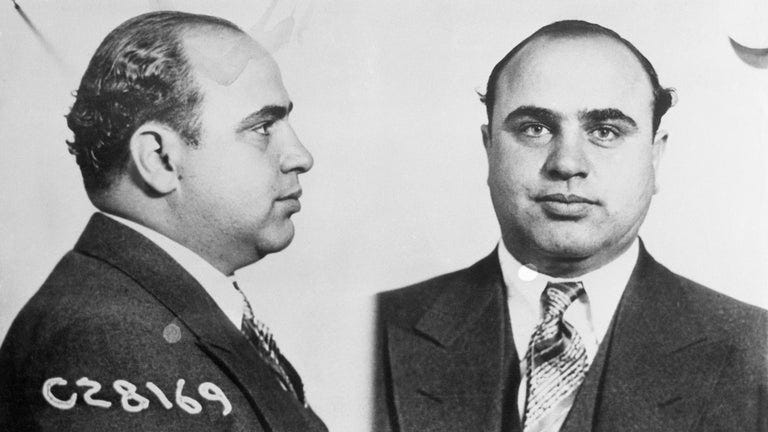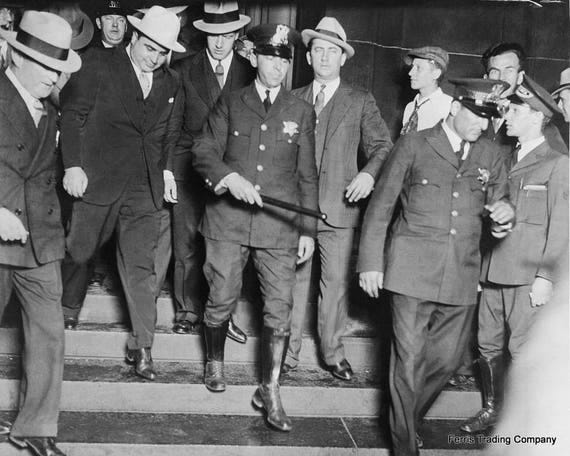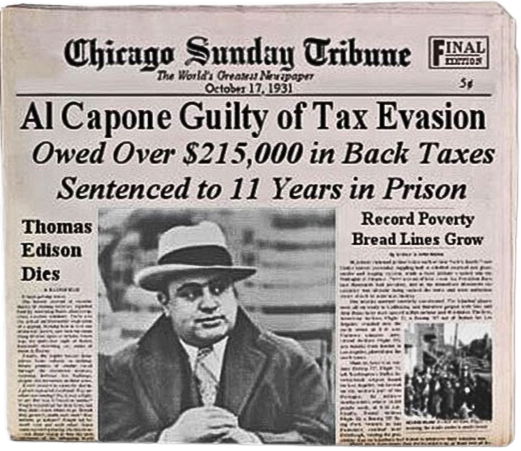October 18 - Weaponized Taxes: How the Treasury Toppled Al Capone
False Security: Dangers of Relying on Loopholes and Half-Truths
This is the day Al Capone, notorious Chicago gangster, was convicted on five counts of tax evasion in 1931.
In today's lesson, we will explore the dangers of relying on loopholes and half-truths to justify our actions. What happens when our carefully constructed defenses crumble? How can we build our lives on the solid foundation of integrity rather than the shifting sands of self-deception?
"If we claim to be without sin, we deceive ourselves and the truth is not in us." - 1 John 1:8 (NIV)
This Date in History
On an early October morning in 1931, the streets of Chicago buzzed with anticipation. Al Capone, the infamous gangster who had terrorized the city for years, swaggered into the federal courthouse, his trademark fedora tilted at a jaunty angle. Little did he know that this day would mark the beginning of the end of his criminal empire.
Alphonse Gabriel Capone, known as "Scarface," had risen from humble beginnings in Brooklyn to become the most feared mobster in America. In the roaring twenties, Capone built a vast criminal network in Chicago, capitalizing on the opportunities presented by Prohibition. His empire encompassed illegal breweries, speakeasies, gambling dens, and brothels. Capone's ruthlessness was legendary; he eliminated rivals without mercy, orchestrating events like the notorious St. Valentine's Day Massacre in 1929.
Despite his notoriety, Capone evaded justice for years. His wealth allowed him to bribe officials and intimidate witnesses, while his public persona as a benevolent businessman providing jobs during the Great Depression garnered him a degree of public support. The federal government, led by President Herbert Hoover, grew increasingly frustrated with their inability to convict Capone for his violent crimes.
The breakthrough came when Treasury official Elmer Irey proposed a novel approach: target Capone for tax evasion. This strategy, while controversial, offered a way to bring down the seemingly untouchable gangster. The idea wasn't entirely new; it had been used successfully against other criminals, but never on such a high-profile target.
Proving Capone's income was a challenge. The prosecution, led by U.S. Attorney George E.Q. Johnson, built their case on circumstantial evidence. They meticulously documented Capone's lavish lifestyle, his property holdings, and his business interests. Undercover agents infiltrated Capone's organization, gathering evidence of unreported income. The prosecution argued that Capone's visible wealth far exceeded his reported income, indicating tax evasion.
Capone initially scoffed at the charges, believing his usual tactics of bribery and intimidation would prevail. However, as the trial progressed, his bravado began to crack. The prosecution's case was airtight, and Capone's attempts to tamper with the jury were thwarted by Judge James Herbert Wilkerson, who switched the jury panel at the last minute.
The trial, which began on October 6, 1931, captivated the nation. Newspapers provided daily updates, and crowds gathered outside the courthouse. Capone's lawyers attempted to negotiate a plea bargain, but the government, sensing victory, pressed on.
On October 18, after deliberating for less than 24 hours, the jury returned its verdict: guilty on five counts of tax evasion. Capone's reaction was one of disbelief and anger. The man who had outsmarted the law for years now faced a lengthy prison sentence.
The conviction of Capone using financial crimes set a precedent that would reshape American law enforcement. It expanded the federal government's power in ways that the founding fathers likely never envisioned. This approach allowed federal agencies to target criminals who operated across state lines, a significant shift in the balance of power between state and federal law enforcement.
While the tactic was effective in removing a dangerous criminal from the streets, it raised questions about the extent of federal power. Some argued that it was a necessary evolution in fighting organized crime, while others saw it as an overreach that could potentially be abused.
Capone's downfall had immediate repercussions in the criminal underworld. Other crime bosses, sensing vulnerability, moved to take over parts of his empire. The Chicago Outfit, however, continued to operate under new leadership, demonstrating the resilience of organized crime structures.
Following his conviction, Capone was sentenced to 11 years in federal prison, fined $50,000, and charged $7,692 for court costs. He was also held liable for $215,000 plus interest in back taxes. Capone served seven and a half years, including a stint in Alcatraz. His time in prison was marked by declining health due to untreated syphilis.
Upon his release in 1939, Capone was a shadow of his former self. He retired to his estate in Palm Island, Florida, where he lived out his remaining years in declining mental and physical health. He died on January 25, 1947, at the age of 48.
The conviction of Al Capone remains a watershed moment in American legal history. It demonstrated that no one was above the law and ushered in a new era of federal law enforcement. While the methods used to convict Capone continue to be debated, their effectiveness in combating organized crime is undeniable. The legacy of this case continues to influence law enforcement strategies and legal debates to this day, serving as a reminder of the complex balance between effective crime-fighting and the limits of government power.
Historical Context
In the early 20th century, the United States was undergoing rapid social and economic changes. The 1920s, known as the "Roaring Twenties," was a period of economic prosperity and cultural dynamism. However, this era was also marked by significant social tensions and legal controversies.
The implementation of Prohibition in 1920 with the 18th Amendment created an environment ripe for organized crime. The ban on the production, importation, transportation, and sale of alcoholic beverages led to a thriving black market. Criminal organizations seized this opportunity, establishing vast networks for the illegal production and distribution of alcohol.
Simultaneously, urbanization was accelerating, with cities becoming centers of both economic opportunity and social challenges. Chicago, in particular, experienced rapid growth, attracting diverse populations and becoming a hotbed for both legitimate business and criminal enterprises.
The political landscape of the time was characterized by corruption at various levels of government. Many officials were susceptible to bribes, creating an environment where organized crime could flourish with relative impunity. This corruption extended to law enforcement, making it difficult to prosecute high-profile criminals through traditional means.
The onset of the Great Depression in 1929 further complicated the social and economic landscape. As unemployment soared and poverty increased, some viewed criminals like Capone, who provided jobs and services (albeit illegal ones), in a more favorable light. This public perception added another layer of complexity to law enforcement efforts.
The federal government was also evolving during this period. Under President Herbert Hoover, there was a push to expand federal law enforcement capabilities to address crimes that crossed state lines. This shift represented a significant change in the balance of power between state and federal authorities.
The legal system was grappling with how to address organized crime, which operated on a scale and with a level of sophistication previously unseen. Traditional law enforcement methods often proved ineffective against these well-funded and well-organized criminal enterprises.
The use of financial crimes as a means to prosecute otherwise untouchable criminals was an innovative approach that reflected the changing nature of both crime and law enforcement in the United States. This strategy would have far-reaching implications for the future of American jurisprudence and the power of federal agencies.
The Capone trial took place against this backdrop of social change, economic upheaval, and evolving legal strategies. It represented a pivotal moment in the ongoing struggle between organized crime and law enforcement, setting precedents that would shape American legal and social landscapes for decades to come.
Did You Know?
Al Capone's nickname "Scarface" came from three scars on his left cheek, the result of a bar fight in his youth where he insulted a man's sister.
Today’s Reflection
Al Capone stood in the courtroom, his usual bravado faltering as the jury's verdict echoed through the halls of justice. The man who had built an empire on violence and corruption now faced defeat, not from the crimes that made him infamous, but from the seemingly mundane charge of tax evasion. This moment of reckoning reveals a profound truth about human nature - our tendency to seek loopholes, to justify our actions, and to believe we can outsmart the system, whether it's the law of the land or the higher law of moral integrity.
How often do we, like Capone, construct elaborate defenses for our actions, searching for technicalities to absolve ourselves of responsibility? We may not be evading millions in taxes, but we engage in our own forms of moral gymnastics. Perhaps it's the white lie on a resume, the "borrowed" office supplies, or the conveniently forgotten commitment. We tell ourselves, "It's not really stealing," or "Everyone does it," weaving a web of self-deception that grows more tangled with each justification.
"If we claim to be without sin, we deceive ourselves and the truth is not in us." These words from 1 John 1:8 pierce through our carefully constructed facades. They challenge us to confront the reality of our own fallibility and the futility of self-justification. Like a house built on sand, our elaborate excuses and rationalizations cannot withstand the weight of truth.
Imagine standing before a mirror, not the kind that reflects our physical appearance, but one that reveals the state of our hearts. What would you see? Would you recognize the person staring back at you, or would you be confronted with the uncomfortable truth of your own self-deception? This mirror of self-reflection doesn't lie or flatter; it shows us as we truly are, stripped of pretense and justification.
In our daily lives, we face countless small decisions that test our integrity. The cashier gives too much change, and we hesitate for a moment. Do we speak up or pocket the extra money? A coworker takes credit for our idea in a meeting. Do we confront them or silently seethe, telling ourselves it's not worth the trouble? These moments, seemingly insignificant, are the crucibles in which our character is formed and revealed.
The danger of relying on loopholes and half-truths extends beyond our individual actions. It seeps into our relationships, our communities, and our society at large. When we normalize small acts of dishonesty or selfishness, we contribute to a culture where integrity becomes negotiable and truth becomes relative. Like a slowly spreading poison, this mindset erodes the foundations of trust and accountability that hold our world together.
But there is hope. The same scripture that exposes our self-deception also points us toward the path of liberation. Acknowledging our sin is not an endpoint but a beginning. It's an invitation to step into the light of truth, to embrace the transformative power of honesty and humility. When we stop trying to justify ourselves and instead seek genuine righteousness, we open ourselves to growth, healing, and authentic relationship with God and others.
This journey toward integrity isn't easy. It requires constant vigilance, a willingness to face uncomfortable truths about ourselves, and the courage to choose what's right even when it costs us. But with each step we take on this path, we open ourselves to the transformative power of God's grace, finding that true freedom comes not from escaping consequences, but from embracing truth in all its fullness.
Practical Application
Take time this week to conduct a personal integrity audit. Reflect on your recent decisions, both big and small, and identify areas where you might be relying on justifications or half-truths. Choose one specific area to focus on and commit to practicing radical honesty, even in situations where it might be uncomfortable or inconvenient. Pay attention to how this shift impacts your relationships, your peace of mind, and your spiritual growth.
Closing Prayer
Heavenly Father, we come before You acknowledging our tendency to deceive ourselves and seek loopholes in Your truth. Forgive us for the times we've relied on our own understanding rather than submitting to Your perfect will. Grant us the courage to face our shortcomings honestly and the strength to walk in integrity, even when it's difficult. Help us to trust in Your grace and to find true security in Your truth, not in our own justifications. In Jesus' name, we pray. Amen.
Supplementary Study
"Whoever conceals their sins does not prosper, but the one who confesses and renounces them finds mercy."
This verse reinforces our lesson by emphasizing the futility of hiding our sins and the freedom that comes with honest confession. It connects directly to the danger of relying on half-truths and the importance of integrity in our spiritual lives.
"Do not merely listen to the word, and so deceive yourselves. Do what it says."
This passage highlights the importance of not just knowing the truth but acting on it. It relates to our theme by warning against self-deception and encouraging genuine obedience rather than finding loopholes or justifications.
"Yet you desired faithfulness even in the womb; you taught me wisdom in that secret place."
This verse from David's psalm of repentance underscores God's desire for true faithfulness and integrity in our innermost being. It connects to our lesson by emphasizing the importance of genuine righteousness rather than outward compliance or clever justifications.
Final Thoughts
The story of Al Capone's downfall serves as a powerful reminder that no amount of clever maneuvering or self-justification can ultimately shield us from the consequences of our actions. In our spiritual lives, we face a similar temptation to rely on loopholes or half-truths, thinking we can outsmart God's standards or justify our shortcomings. But true freedom and security come not from finding ways around God's truth, but from embracing it fully. As we strive for integrity in all areas of our lives, we open ourselves to God's transforming grace, finding that honesty before Him and others leads to a life of genuine peace and purpose.
Community Engagement
Share your thoughts or use these questions to get the conversation started.
Reflecting on Al Capone's story, can you recall a time when you thought you could outsmart a system or rule, only to face unexpected consequences?
In what areas of your life do you find yourself most tempted to justify actions you know deep down are wrong?
How can we cultivate a community that encourages honesty and integrity rather than clever justifications?
What steps can we take to align our actions more closely with our professed beliefs, avoiding the trap of self-deception?
This devotional is free to read. You can support this publication by becoming a subscriber, upgrading to paid subscriber status, liking (❤️) this post, commenting, and/or sharing this post with anyone who might enjoy it.
In tomorrow's lesson, we'll explore how a moment of apparent defeat can lead to unexpected triumph. Prepare to discover how surrendering control might be the key to unlocking God's greater purpose in your life.
Bonus - Did You Know?
Capone was known for his flamboyant and expensive taste in clothes. He often wore custom-tailored suits and silk shirts, spending an estimated $1,000 a week on clothing in the 1920s.
Despite his fearsome reputation, Capone was one of the first gangsters to open a soup kitchen during the Great Depression, serving three meals a day to ensure that "no one in Chicago should starve."
Capone's downfall was partly due to his own boasting. In a 1931 interview, he claimed that "they can't collect legal taxes from illegal money," which caught the attention of federal investigators.
During his imprisonment in Alcatraz, Capone's mental health deteriorated significantly due to neurosyphilis. He often spent time playing banjo in the prison band.
The St. Valentine's Day Massacre, one of the most notorious gangland killings associated with Capone, used weapons that were disguised as police equipment, including two Thompson submachine guns.
After Capone's conviction, President Herbert Hoover reportedly said, "The American people expect more from their public officials than deeds of heroism once in a lifetime. They expect them to keep up the battle persistently, punishing crime day by day in all its forms."
Additional Resources
Get Capone: The Secret Plot That Captured America's Most Wanted Gangster - Jonathan Eig
Capone: The Man and the Era - Laurence Bergreen
Al Capone: His Life, Legacy, and Legend - Deirdre Bair
Scarface and the Untouchable: Al Capone, Eliot Ness, and the Battle for Chicago - Max Allan Collins and A. Brad Schwartz











It was interesting to see the newspaper with the same day news of Edison's death.
Once again, another history lesson with details that I was unaware of.